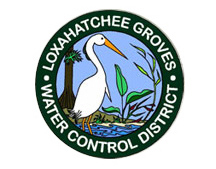At a workshop hosted Tuesday by the Town of Loxahatchee Groves, residents packed into Loxahatchee Groves Town Hall to discuss the upcoming referendum on whether or not the Loxahatchee Groves Water Control District should become dependent to the Town of Loxahatchee Groves, and about the ongoing bad condition of the town’s roads.
Mayor Dave Browning said that the town is pursuing a way to collect additional revenue to upkeep the roads, and a way to share the costs with residents who choose to participate in the paving of roads.
If the district becomes dependent, the town would be able to use the district’s money for roads, as its current sole responsibility is for canals and drainage at an assessment of $145 an acre, he said.
“We are going to have to find something to take care of the roads, because the town now has all the roads. Therefore, we will have to put an assessment,” Browning said. “The size of that assessment will depend on what we have to do with the water control district. In the long run, once we get all these roads straightened out, we will be able to take care of the roads with gas tax money. Right now, we’re in a spot.”
Browning noted that he sat on the LGWCD Board of Supervisors for 11 years, where he fought at the time to keep the district independent from the town.
“What has happened since then, it has changed,” he said. “The mentality has changed. The attitude has changed. When we’ve had emergencies, and we called them, they said, ‘Well, no, we can’t do that.’ I really had dreams and visions that the two could get along fine. That really hasn’t happened.”
Browning added that having the district and the town separate is confusing for residents who have to participate in separate elections and go to separate offices to deal with issues when they do not know whether it is the town’s or the district’s responsibility.
He added that if the referendum passes, the town council would assume the role of district’s board of supervisors.
“When and if it becomes dependent to the town, it smooths all that over, and the bottom line is, you’ve got one board here,” Browning said. “And if you don’ like what we’re doing, you vote us out. On the LGWCD board, the voting is done by acreage, which means that one person can go out and get a lot of acres signed off by people who don’t live here, or really just have a lot of investment in property, and they can place anybody they want on that board, so there’s a difference.”
One resident encouraged people to vote against the June 25 referendum on dependency, asserting that the shift will change people’s grandfathered property rights and raise taxes drastically.
Contrary to the resident’s statement, Councilman Todd McLendon stressed that dependency, if approved by voters, would not affect any property rights held currently by the district or its residents.
Browning said that he could not understand how the district’s dependency would raise taxes, although the town does face a hard time fixing the roads it inherited from the district. That is a cost that will happen no matter what the outcome of the June 25 vote.
“At first, it’s going to cost more because our roads are a mess and we have to fix them,” Browning said. “We have to get them right, so we have to turn that around in our town.”
McLendon added that the town had received a letter from the South Florida Water Management District informing it that there would be no change in water permits should the referendum pass.
Mark Jackson of D Road shared several residents’ concern about the poor condition of the roads.
“When the town took over the roads, they said how they were going to take care of everything, because they said the district, all they were doing was grading and not putting material down,” Jackson said. “After the town got them, they didn’t do anything for three or four weeks or better, and then we started having rains and things are just getting ridiculous.”
Jackson said he felt the town should turn the roads back over to the district. “They did a much better job,” he said.
McLendon said nobody in the room likes the condition of the roads.
“The town has been responsible for all of the roads since incorporation, not the district,” he said. “The town has given the district $2 million since incorporation to maintain those roads, plus the millions of dollars the district has collected in their assessments.”








